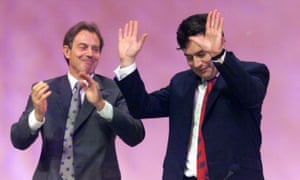
My Life, Our Times by Gordon Brown review – formidable but destructively flawed
Brown’s memoir is great on his years in the Treasury but suffers from his fixation with the leadership
When he was at the Treasury, it was one of Gordon Brown’s stock jokes that there are two kinds of chancellor: those who fail and those who get out in time. There is actually a third type: himself. He has a unique record. In post for more than a decade, he was the longest-serving chancellor under universal suffrage. Thanks to the enormous latitude over economic and social policy that he was granted by Tony Blair, no postwar chancellor has been a more formidable force. He married the energy of his ideas with the force of his personality and combined them with the power of the Treasury to drive an impressive agenda of domestic reform.
He made a successful mission of tackling child poverty. He did the same for pensioners to the point where debate has moved on to whether older people are now getting too good a deal at the expense of the young. He gave the Bank of England its operational independence, blocked Blair’s desire to take Britain into the euro and introduced the minimum wage. When he imposed a windfall profits levy on the privatised utilities and later raised national insurance contributions to bring in extra money for the NHS, he proved that progressive governments can sometimes make tax rises that are popular. He was also a force abroad, not least as a spearhead of the effort to wipe out debts in the developing world. He makes the claim – and I think this is a highly reasonable contention – that Britain became “a fairer country” during the New Labour years in which he played such a pivotal role.

Tony Blair applauds Gordon Brown’s speech at the 1999 Labour party conference in Bournemouth.
He trumpets his achievements, which is always expected from a political memoir. He acknowledges some of his mistakes, such as the debacle over the 10p tax band and failing to spot how reckless the banks had become in the run up to the Great Crash. He is very good at describing the process by which an idea for reform is germinated, then shaped into a policy before being executed.
The most valuable chapters here are those that describe how they averted a total implosion of the banking system
This book, like its author, is best in the Treasury. This book, like its author, goes all wrong whenever it gets on to the subject of leadership, the raging battlefield between him and Blair, which so disfigured their time in power. He was obsessed about it when he was plotting to supplant Blair; he remained obsessed even once he had prised him out; and he continues to be just as obsessed these many years later. It all goes back to 1994, when John Smith’s death meant that Labour needed a new leader and the greatest imperative was to find someone who could get them back to power after four election losses. Brown believed he was entitled to the leadership. Most of the rest of the Labour modernisers thought the party needed someone with more appeal to the swing voters of middle England, and that meant Blair.
To this day, and contrary to the judgment of just about everyone else who has seriously examined the subject, Brown insists that it ought to have been him. “I had no doubt I could and would win.” If he really thought that, he should have stood. It would have been better all round. Instead, the two men did a deal that left Blair overly deferential to Brown and Brown overly expectant about the succession. He insists here that he had a definite promise that Blair would stand down during a second term. Even if such a promise was really made – Blair says not – Brown was oddly naive to think that it was bankable, especially once the other man had won back-to-back landslides. For such a clever man, Brown can be surprisingly dim about how politics works.
Blaming Blair alone for the breakdown in their relationship and how that poisoned their government, Brown never once considers whether his own behaviour might have had something to do with it. A senior New Labour figure was reminding me the other day of one of the many epic rows between the two men. A confrontation in the prime minister’s study climaxed with Brown slamming out of the room so violently that the door lost one of its hinges. You won’t find that incident here. Nor any of the other ugly episodes that made him such a nightmare as a partner for a prime minister.
He is revealing about why he became so fixated. “I felt I was running out of time. I was very much aware that the public get fed up with politicians who have been in the public eye – and direct line of fire – for too long.” Blair was eventually forced to announce his retirement in 2006 after a dramatic week of skulduggery. About this critical moment, Brown writes just the one line: “I still wanted a consensual transition; so when, without my knowledge, a group of ministers resigned from their posts because of their impatience to see a change, I helped put the rebellion down.” Come off it. Ed Balls and other key lieutenants were instrumental players in that coup, so I am being extremely charitable when I say this description is disingenuous.

Moody, angry, naive: yes, he was flawed but Gordon Brown did save the world
The awful irony is that when he finally got the top job he found that he didn’t have the temperament for it. At the time, he frequently looked swamped by the sheer volume and velocity of decision-making that is required of a modern prime minister. That feeling is confirmed by this book. While he writes with clarity, structure and confidence about his chancellorship, it is one-damn-crisis-after-another when we reach the chapters about his time as prime minister. He ruefully remarks: “It is often those with the best-laid plans who are most at the mercy of events.” He fell out horribly with many of his senior colleagues, including his appointment as chancellor and one-time friend, Alistair Darling. The most valuable chapters here are those that describe how they averted a total implosion of the banking system and a slide into global depression. He led the world in that. It was his high point as prime minister because he could access the skill sets and contacts that he had developed at the Treasury. He was most effective as prime minister when he could go back to being chancellor.
The job otherwise defeated him. This he largely blames on his failure to make a “connection” with the voters and inability to do “I feel your pain” politics. The problem was not that he lacked emotion. He writes very movingly about the death of baby Jennifer Jane, his first child with Sarah. “I could not listen to music for more than a year.” You feel great sympathy and admiration for his tenacity when he describes the consequences of being kicked in the head on a rugby field as a young man. He lost his sight in his left eye and nearly that of his right as well and has spent a lifetime living with the threat that he could go completely blind.
He is a shy man who was brought up “to contain, even suppress, my inner feelings in public”. That, he thinks, explains why “I failed to persuade the British people” not to throw him out in 2010. “No matter what I did to get my message across I often fell short.” He believes himself to be a politician “out of season” who did not master the revolution in communications and public expectations of leadership.
I guess he finds it a consolation to believe that his only serious failing was one of presentation. The real tragedy is a deeper one. He should have derived huge satisfaction from being one of the most formidable chancellors that Britain has ever seen. He instead devoured mammoth amounts of time and energy – and wasted that of many colleagues as well – in the destructively obsessive pursuit of the premiership, a job that, when he finally got it, overwhelmed him.
No comments:
Post a Comment